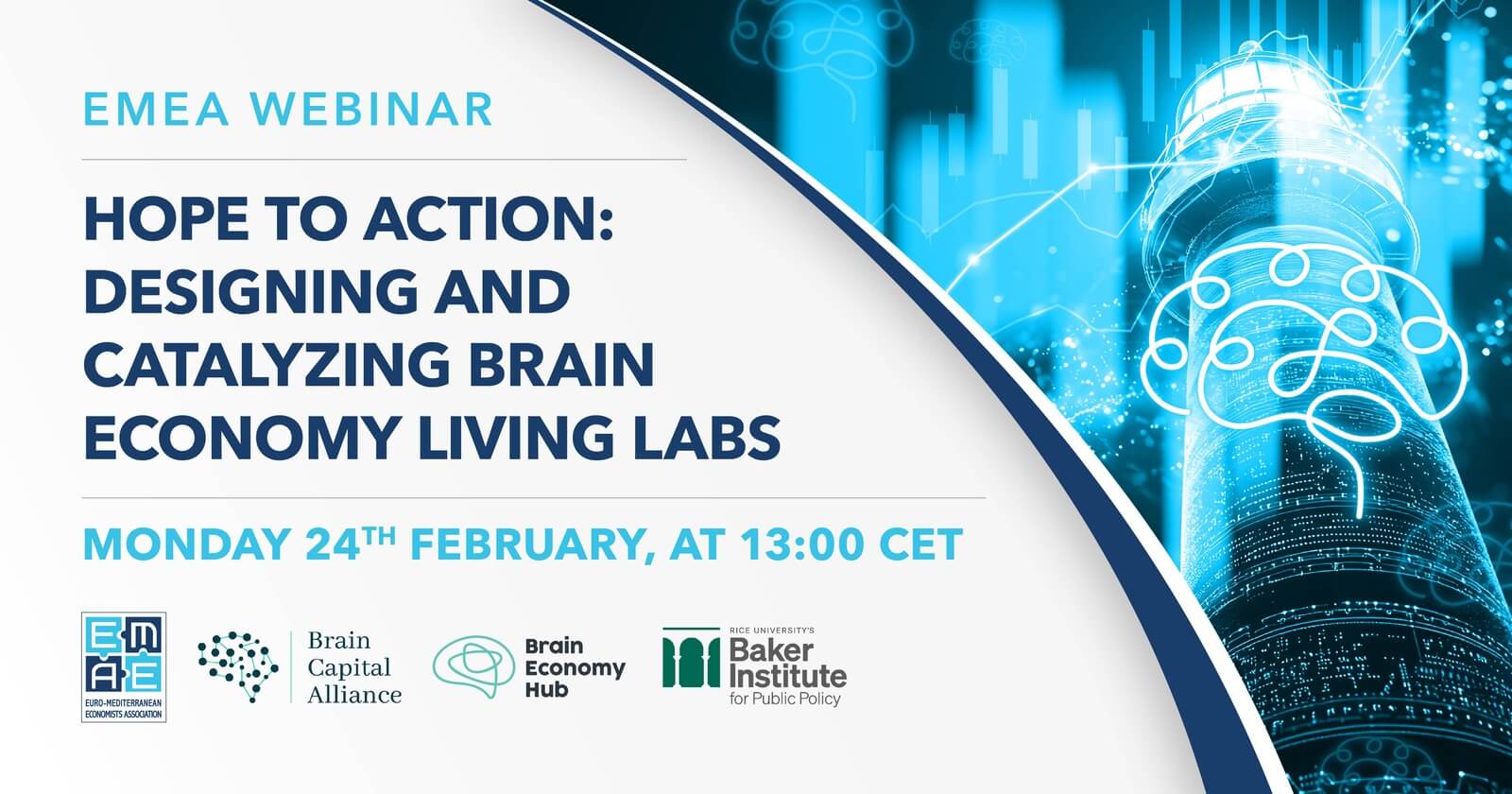
- This event has passed.

The webinar, “Hope to Action: Designing and Catalyzing Brain Economy Living Labs” , brings together leading experts from the public, private, and philanthropic sectors to discuss how regional economic living labs can be implemented to demonstrate that the brain economy model enhances productivity, well-being, and human flourishing. These living labs span multiple sectors, integrating advanced economics, finance, and research methodologies.
The event is organised by EMEA, in cooperation with the Brain Capital Alliance, the Brain Economy Hub, the Neuro-Policy at Rice University’s Baker Institute for Public Policy, and it will take place on Monday 24 February 2025, 13:00 CET on Zoom.
The future of economic growth depends on optimizing brain capital, a form of human capital that encompasses brain health with cognitive, emotional, and social skills that drive innovation, productivity, and resilience. Today, underinvestment in brain health is leaving trillions in economic potential untapped.
All global economies are at a critical inflection point:
- The global economy is losing $2.5 – $8.5 trillion annually due to lost productivity from brain disorders.
- The knowledge economy requires peak cognitive performance to sustain workforce adaptability in the face of technological innovation and AI.
- Aging populations and rising neurodegenerative diseases risk hurting productivity and increasing healthcare and social costs.
- Geopolitical uncertainty and digital misinformation highlight the need for cognitive resilience as a national security asset.
- Business leaders are calling for policies that strengthen workforce resilience, innovation, and sustainable growth, all of which depend on brain capital.
According to the McKinsey Health Institute and the World Economic Forum, the brain economy is a new economic paradigm that prioritizes brain capital, encompassing brain health and brain skills, as its core asset. Driven by a neuroscience renaissance, it responds to the growing demand for brain skills — cognitive, emotional, and social — in the modern workforce.
At the 2025 World Economic Forum meeting in Davos, brain health was identified as a priority issue as noted by Forbes Magazine for global policymakers, business leaders, and wider civil society. As technology and AI reshape the workplace, brain skills like creativity, resilience, and curiosity are becoming increasingly vital. The World Economic Forum’s 2025 Future of Jobs Report highlights that half of the top skills on the rise are brain-related. According to the McKinsey Health Institute, employers who invest in employee brain health and well-being can enhance performance and potentially boost global GDP by up to 12%. Brain health has been noted as foundational to smooth brain skill-based economic transitions such as the energy transition and digital transition.
AGENDA
Moderator: Harris Eyre, Lead and Senior Fellow, Neuro-Policy, Rice University’s Baker Institute for Public Policy, Executive Director of the Brain Capital Alliance and the Brain Economy Hub, Advisor to the Euro-Mediterranean Economists Association: Brain Economy Systems Change Strategies
Speakers:
- Prof. Rym Ayadi, EMEA Founder and President, Co-founder of the Brain Capital Alliance and of the Brain Economy Hub: Keynote Address
- Kana Enomoto, Director of Brain Health, McKinsey Health Institute: Keynote “Brain economy perspectives”
- Stephen Reynolds, Director of Public Policy, Greater Houston Partnership: Keynote “The Greater Houston Region’s Leadership of Economic Transitions”
- Shiva Dustdar, Dean, European Investment Bank Institute
- Giulio Taglialatela, PhD, Director of the UTMB Moody Brain Health Institute and Vice President for Brain Health, UTMB: Keynote “The Greater Houston brain economy transition”
- Rajinder Dhamija, Chair of the Indian Government Brain Health Task Force: Keynote: “The Indian Brain Economy: The World’s Most Populous Nation”
Discussants:
- Steve Carnevale, Founder, UCSF Dyslexia Center, California Mental Health Commissioner
- Paola Zaratini, Director of Scientific Research AISM
- Penny Dakin, Executive Director, Communities, Minderoo Foundation
- Facundo Manes, Argentine Congressperson
- George Vradenburg, Chair, Davos Alzheimer’s Collaborative and UsAgainstAlzheimer’s
- Cara Altimus, Managing Director, SPARC (Science Philanthropy Accelerator for Research and Collaboration), Milken Institute
Event video: https://www.youtube.com/watch?v=t3G-AwzeDvg

